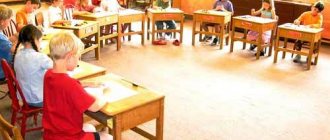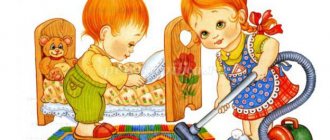How to prepare your child for school with the help of games?
Learning tasks are the best way to develop the intelligence of your son or daughter so that the child loves learning and does not get bored in the process. We have collected 3 educational games that will help mothers prepare their children for school.
“Find and Circle” task: remembering letters
Give the future student a page from a newspaper or magazine and ask him to find and highlight a letter everywhere with a pencil. For example, all "b".
Task “What is this?”: training speech
The parent names a subject, and the future student describes it in detail. If the child is in doubt, tell him what qualities you can talk about: color, shape, what it is made of, size, etc. This game will help prepare your child at home for Russian language lessons at school.
Task “Associations”: developing logic
Tell your child words and ask him to match them with a pair. For example: tree - leaf, house - roof, sea - waves. It is important that he himself explains why he chose such a pair for the word.
Reminders on how to prepare your child for school yourself
The tasks that the school psychologist offers during consultation will help you understand what level of development the child is at. This is a mandatory stage, for the successful completion of which you need to work with the child for a long time.
Educational activities
Moms and dads should remember: your baby may not be able to do something. Don't put too much strain on your young head. The school is designed to tell the child about a huge number of things, broaden his horizons, and teach him how to live and work in a team.
However, there is a set of basic knowledge that a first-grader must possess:
- Full names, yours and your parents'.
- Address. Country, city, street and house in which he lives.
- Famous plants, animals and birds. The child must distinguish between popular plants and animals, distinguish a cactus from a chamomile, a fox from a tiger. A person who checks readiness for school may ask if there are any pets at home, ask to tell about a cat, a dog, a parrot. He can also find out which animal or plant the examinee likes most and ask why.
- Time. It is advisable that the first grader knows how to handle a watch. The main thing is that he distinguishes day from night, evening from morning. One of the options for the task: “Arrange the pictures in the correct order.” Most often they depict the daily routine.
- Geometric figures. Before entering school, most children know how to cut out a circle, triangle, or square. In addition, they are required to correlate objects by shape: the roof of the house looks like a triangle, and the house itself looks like a square.
- Colors. Boys and girls in preschool age learn not only the basic shades, but the number of colors in the rainbow and the order of their arrangement. Parents need to teach their child to draw basic pictures, choose the right colors for the image: the sun is yellow, the grass is green, and the bunny is white.
- Numbers. It is not necessary to teach the rules of subtraction and addition; the teacher will do this. Better teach how to count from 1 to 20 and back.
- Seasons, months, days of the week. During preparation, children should not only name them, but also know the number and place them in the correct order.
- Popular holidays. The psychologist may ask which one is your favorite. The kid must answer and tell why he chose this option.
- The structure of the human body. Drawing a person is a common task when entering school.
- Distinguish between living and nonliving.
- Basic traffic rules: “You can’t cross the road when it’s red,” “You can’t cross railroad tracks.” In a game form, a school worker can test this knowledge. For example, clarifying who is right, the green bunny who is waiting or the squirrel who is running in front of a moving car.
- Reading by syllables. If your child doesn’t know how to read, it’s not a big deal – they’ll teach you at school. However, this skill will greatly facilitate his learning in the future, and all other subjects will be easier.
- Retelling. Developing speech skills is one of the main tasks when entering first grade. At the beginning of the school year, the child must understand the meaning of short stories and arrange sentences in a logical chain.
- Memory. Several pictures are placed in front of the preschooler, he looks at them for a while, then they are turned over. The more details he remembers, the better. We need to reproduce the plot and tell what is depicted there.
Often school psychologists give tasks to identify unnecessary things. There are a large number of entertaining tutorials on which you can practice this skill, but classes can also be carried out using improvised means.
For example, ask your baby to choose what needs to be put away by offering him several fruits and one vegetable.
Behavior in society
Parents of a young schoolchild should think not only about academic performance, but also about how to help him join the class team. We offer recommendations that will help you understand how to quickly prepare your child for school over the summer.
Develop in it:
- Independence. Teach your child to dress and tie his own shoelaces, take care of his appearance and change into sportswear before physical education. You can show that he is an adult, an equal, but this status has not only privileges, but also responsibilities. There is no need to collect the briefcase for him; it is better to check when the job is already done. The same goes for homework: try to convey in a gentle manner that keeping a school diary is his business. But don't go too far on this issue. Remember that first of all, the baby should feel your love and support. Let him feel that he has a reliable rear where he can come with any problem, both life and academic.
- Perseverance. It’s difficult for little ones to readjust after the unemployed years of childhood, and the time of a standard lesson seems like an eternity to them. When exercising with your son or daughter, help them get used to doing an activity for a while, gradually increasing the load. We recommend starting with 15 minutes, and by the beginning of the school year increase the time to half an hour.
- Friendliness. Tell them why you shouldn’t fight with your classmates and call them names, but don’t forget to add that you need to be able to stand up for yourself. Explain that lying is bad. At the same time, try to convey that in some situations it is necessary to tell adults about what happened. For example, if someone tortures animals or offends the weak.
- Politeness. Teach your son or daughter the formulas of etiquette communication. Remind that when meeting any person you need to say “hello”, and when saying goodbye “goodbye”, explain about “thank you” and “please”.
A very important point that you should set your child up on is cultural behavior during recess. He must know that at school he cannot run through the corridors, shout, or climb on furniture with his feet.
Child health and preparation for school
Remember that at 7–8 years old, when a child enters first grade, his body is actively growing and changing. Children need physical activity at this time, so check whether the gym at your chosen school is well equipped. It would be great if there was a pool there.
Before the school year, it is useful for a child to take a break from communicating with a large number of people and the bustle of the city. Psychologists are confident that a mini-vacation in the village with grandparents will help replenish moral strength before school.
With whom and where to study?
At the kids' club? Privately with a teacher? In preparatory groups at school?
It's not about the premises, but about the specialists who will do their job in any institution.
The “advantages” of group classes at school are the opportunity to see the school and its everyday life, so to speak, from the inside, the opportunity to meet the future teacher, and for the child to get used to the environment. This is especially important for the overwhelming majority of children at home who did not attend kindergarten.
The desire of many parents to have their child deal with individually is not always justified.
Indeed, during an individual lesson, all the teacher’s attention is directed to one child. But at the same time, the child is tense, as he must be in a state of constant attention, and this is very difficult.
Based on many years of practice, I see that classes in a small group (4-5 people) are much more productive. With so many children, my attention is enough for everyone, I see everyone and can help everyone in time. On the other hand, my attention is distributed evenly, and the children feel less stressed, learn to cooperate, hear each other, which is also one of the components of readiness for school.
If possible and necessary, you can combine group classes with individual classes.
To teach or not?
Have you noticed that when I talk about readiness for school, I’m not talking about teaching a preschooler, for example, to read? Does this need to be taught?
There can be no clear answer to this question.
I am far from saying that children should not be taught to read before school. It’s not bad if a child can read before school. The only important thing is at what cost this skill was given to him. Was it the desire of the child himself or the desire of the parents “not to lose face”?
A typical mistake of parents is that they begin teaching their child to read (or other elements of the school curriculum) by their own volitional decision, without taking into account the level of his development.
When an inquisitive, active child with developed thinking and speech is drawn to learning to read or is very interested in numbers and counting, then, of course, it is necessary to support his interest and help him learn. Training in this case will be quite appropriate.
But if parents take on this work, then they must have certain knowledge of teaching methods and must be sure that the child will develop the correct skill. If you are not so sure, it is better to turn to specialists.
It happens that the child is not mature, not ready and, accordingly, does not strive for these school skills. In this case, artificial learning will be violence.
As if there was no preparation at all
There are many moments in our ordinary home life that can rightfully be considered preparation for school and which naturally fit into the life of any family.
Walking, skating, skiing, swimming - everything that improves health is very important for a child’s future school life. Encourage activities that develop thinking, imagination, and motor skills: drawing, modeling, designing, embroidering.
The best way to develop speech, attention, imagination, and memory is to read books to your child. Read every day, read even if your child already knows how to read. Your reading will not replace either watching cartoons or listening to tapes.
Cooperate with your child, do not refuse his help in adult matters: from repairing a faucet to making dumplings. Be prepared to help yourself if necessary.
Play games that have clear rules.
Pay special attention to the child’s desire to learn new things, the ability to communicate and find a common language with children and adults, the ability to overcome difficulties, and bring the job started to completion.
Consultation for parents. Child's readiness for school
Consultation for kindergarten parents. How to prepare your child for school
Author: Rita Shotaevna Chobanyan, teacher of the Central Children's Educational Institution No. 7 of Kurganinsk, Krasnodar Territory Description: recommendations from the teacher to parents of preschool children on preparing for school. Goal: To equip parents with knowledge about the essence of “School Readiness” and to provide recommendations. Questions for discussion: 1. Your child is a future first-grader. 2. Tips for parents. Your child is starting first grade. Soon the school will open its doors and a new period in his life will begin, so different from his preschool childhood. How a child will enter a new life, how the first school year will turn out, what feelings, hopes, aspirations he will awaken in his soul, depends to a huge extent on what he acquired during the years of preschool childhood. How can you tell if your child is ready for school?
How to properly prepare a child for school?
Of course, a child needs a stock of knowledge. Parents are sometimes pleased that the child remembers the text - a poem, a fairy tale. But it is much more important for mental development to understand the text and be able to retell it. One of the most important tasks in preparing children for school is the development of
the “hand motor skills” necessary for writing.
Let your child sculpt more, assemble small mosaics, and color pictures. And, of course, a special place in preparing children for school is occupied by mastering some special knowledge and skills
- literacy, counting, solving arithmetic problems.
Some advice for you parents: - develop
your child’s perseverance, hard work, and the ability to get things done.
- develop
his thinking abilities, observation, inquisitiveness, interest in learning about others.
— give
your child riddles, make them up together with him, let the child reason out loud, do not give the child ready-made answers, make him think.
- talk
about the books you read, try to find out how the child understood their content, whether he correctly assessed the actions of the characters, and whether he is able to prove why he condemns some characters and approves of others.
Also, when determining whether a child is ready to study, one should take into account the child’s desire to go to school and study, what opinion he has formed about school and about studying in general. Preparing a child for school begins from an early age, right from birth, just as the child receives his first knowledge in kindergarten and in communication with his parents. What knowledge should a child go to school with? How to prepare your child for school? 1. A preschooler learns through play, where parents actively and equally participate. 2. Training requires systematicity: 10-15 minutes every day will give greater results than an hour or two on weekends. 3. It is necessary to take into account the principle “from simple to complex”, that is, you cannot immediately teach a child everything you know and can do; each new element is added gradually, when previous knowledge and skills have already been mastered. If the child answers uncertainly, then return to simple tasks and games, changing their content, but leaving the goal. For example: learn to recognize and name colors. When one color is mastered, a new one is added, and the old one is consolidated in the game “What’s missing?” 4. Don’t forget to evaluate successes, and in case of failures, approve the child’s actions with the words: “If you had done it this way (showing, explaining), it would have been even better.” 5. Try not to give your child the impression that activities and games with him are the meaning of your life, so play with your baby, for example, while preparing dinner in the kitchen (“What’s missing?”, “What’s changed?”), on the way in kindergarten, in the car, on the bus (“Words-Cities”, etc.) 6. Children are emotionally responsive, so if you don’t want to play a game or you don’t feel well, then it’s better to postpone the activity. If you are in a bad mood, do not play with your child through force. This will not bring any benefit. Game communication should be interesting for both him and you. In this case, a positive atmosphere is created for assimilation and development. 7. Conduct observations and conversations with children, let them feel like a pioneer. For example, watch the clouds with him, find in them similarities with figures of people and animals; “measure” the depth of a puddle, observe natural phenomena. The most common and correct opinion remains that before entering school, parents or kindergarten teachers must give the child basic knowledge - know sounds and numbers, draw with pencils and paints, cut out pictures with scissors. But the most important thing is that when preparing a child for school, it is necessary to take into account his individual abilities and evaluate the talents of his child. Correct assessment of these qualities and help in case of any problems will help the child successfully adapt to school and gain knowledge, joy and pleasure. (prepared based on materials from the methodological manual by O.L. Zvereva “Parent meetings in preschool educational institutions”).
We recommend watching:
Raising interest in school in children of the preparatory group Teaching literacy to children 5-6 years old Advice for parents of future first-graders Summary of a comprehensive lesson on preparing children 6-7 years old for school
Similar articles:
Learning the alphabet with preschoolers in kindergarten
Children's perception of information
Fatigue and overwork in preschool children
Educational coloring books for children from 3 to 5 years old
Excursion for preschoolers to school





